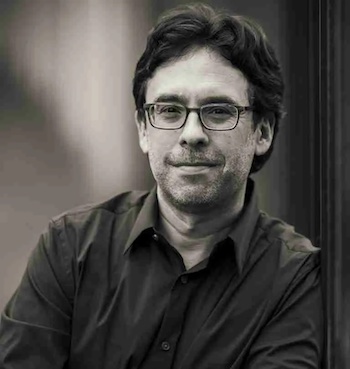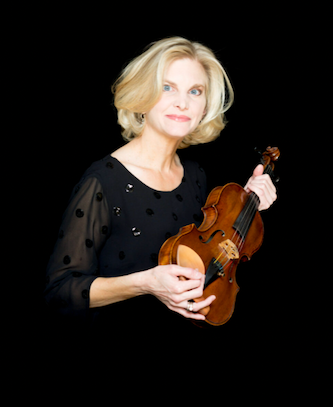Concert Review: Concord Chamber Music Society’s “The Music of Memory” — An Unusually Beautiful Program
By Susan Miron
It was worth driving over 70 miles of snowy roads to be rewarded with such invigorating heat. Bravo tutti.

Critic and author Jeremy Eichler. Photo: Tom Kates
For their first program at the new Groton Hill Music Center, the Concord Chamber Music Society (CCMS) assembled a most unusual and beautifully played program. Founded 24 years ago by longtime BSO violinist Wendy Putnam, the group had traditionally put on their concerts at Concord Academy. The performances of theirs I have heard over the years have been consistently well played by a lineup of superb instrumentalists. My consistent feeling was that these were really lovely community concerts.
The first CCMS engagement at Groton Hill Music Center’s spectacular new hall had two unfortunate events to deal with. Pianist Yefim Bronfman was supposed to have opened the series last spring but was forced to cancel. (Instead, he will appear at the Groton Hall Music Center this year, on March 17 ). Anticipation for last Sunday’s concert was great; it was sold out, with a lengthy wait list. Unfortunately, the weather was horrid: the brave souls who trekked out to Groton in face of a gusty snowfall sat in a half-empty hall for what was an outstanding afternoon of music and intellectual stimulation.
This event was a collaborative project between music critic Jeremy Eichler and a superb string quartet. Eichler’s magisterial music/history study Time’s Echo: The Second World War, the Holocaust, and the Music of Remembrance has earned considerable praise and several prizes. I was one of the first to sing the book’s praises (for The Boston Musical Intelligencer; Jonathan Blumhofer recently raved about the volume in the Fuse). Eichler chose two of the four composers he discusses in his book. After he talked about the artist, the quartet played a composition by him.
Eichler, the Boston Globe’s chief music critic, introduced the afternoon’s two works by Benjamin Britten (1913-1976) and Dmitri Shostakovich (1906-1975) with his usual panache and thoughtfulness, displaying an impressive knowledge of both the music’s history and the composers’ lives. His sympathetic depiction of the composers’ extraordinary friendship made Eichler’s book an unusually moving reading experience, and that strength was evident in his comments. Both composers — private, shy, solitary and sensitive — saw themselves as perennial outsiders, but recognized in each other a kindred spirit and a source of deep inspiration.

Longtime BSO violinist Wendy Putnam. Photo: Courtesy of the CCMS
Britten, along with his life partner, tenor Peter Pears, was a conscientious objector and felt he had missed out on confronting the real suffering in the war. This led Britten to undertake a recital tour with violinist Yehudi Menuhin through some Displaced Persons and recently liberated concentration camps. The shock of what he encountered left him speechless: it wasn’t until the end of his life that he could describe how he felt about what he saw. The music written after this shattering series of postwar performances colored everything Britten wrote afterwards, including the String Quartet 2 and his renowned War Requiem.
Britten and Shostakovich, their countries, times, and the politics that shaped their lives and their music, are covered in great depth and sensitivity in Time’s Echo. Most compelling, besides the story of their creation of indelible musical memorials, is the evolving story of their friendship. Renowned Russian cellist Mstislav Rostropovich served as their go-between. Eichler deftly depicted this connection in his two 20-minute reflections before each of the quartets. Shostakovich adored the War Requiem, and dedicated his next major work, the 14th Symphony, with its poems about death and immortality, to Britten.
Britten’s three-movement String Quartet No. 2 (1945) was given a luminous performance by violinists Wendy Putnam and Axel Strauss, violist Cathy Basrak, and cellist Will Chow. All the musicians but Strauss, the first German to win the Naumburg Award, are members of the Boston Symphony Orchestra. The third movement, entitled “Chacony,” refers to Henry Purcell, whose death 250 years before was being commemorated. The CCMS performance of this piece was ineffably moving, especially “Chacony.”
For Shostakovich’s String Quartet No. 3 (1946) the two violinists switched places, with Strauss acting as an exceptionally fine first violinist. I had heard Putmam and Cathy Basrak many times; they were their customary excellent selves. The new BSO cellist, Will Chow, was seriously impressive.
Eichler believes that these compositions serve as a bridge across time, a connection that “burns through the cold storage of history.” These performances skillfully dramatized that idea, and the new hall’s excellent acoustics accented the dazzling fire of the music, the illuminating talks, and the powerful performances. It was worth driving over 70 miles of snowy roads to be rewarded with such invigorating heat. Bravo tutti.
Susan Miron, a harpist, has been a book reviewer for over 30 years for a large variety of literary publications and newspapers. Her fields of expertise were East and Central European, Irish, and Israeli literature. Susan covers classical music for the Arts Fuse and the Boston Musical Intelligencer.
Tagged: Concord Chamber Music Society, Groton Hill Music Center, Jeremy Eichler, Time’s Echo
